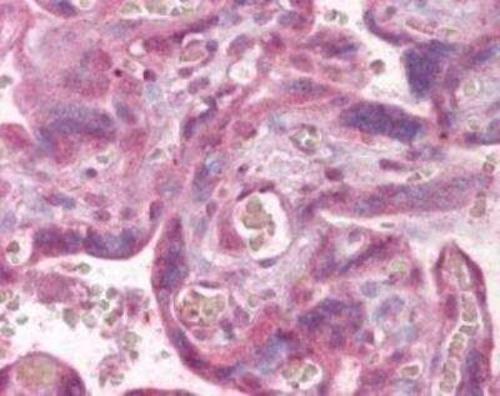PLK1 Rabbit Polyclonal Antibody
Frequently bought together (3)
Transient overexpression lysate of polo-like kinase 1 (Drosophila) (PLK1)
USD 396.00
Other products for "PLK1"
Specifications
| Product Data | |
| Applications | IHC, WB |
| Recommended Dilution | Immunohistochemistry, Western Blot: 1:1000-1:2000, Immunohistochemistry-Paraffin, Immunocytochemistry/ Immunofluorescence |
| Reactivities | Human, Mouse, Rat, Bovine, Canine, Porcine, Primate |
| Host | Rabbit |
| Clonality | Polyclonal |
| Immunogen | A portion of amino acids 100-200 of human PLK1 was used as the immunogen. |
| Formulation | Store at 4C short term. Aliquot and store at -20C long term. Avoid freeze-thaw cycles. |
| Concentration | lot specific |
| Purification | Whole antisera |
| Conjugation | Unconjugated |
| Storage | Store at -20°C as received. |
| Stability | Stable for 12 months from date of receipt. |
| Gene Name | polo like kinase 1 |
| Database Link | |
| Background | Polo related kinase (PLK), a serine/threonine kinase is strongly correlated with the mitotic activity of cells. PLK is present in all tissues during mouse embryonic development, where as in adults expresion is limited to thymus and ovaries. It has been observed that tumors of various origin (lung, colon, stomach, smooth muscle, and esophagus as well as non-Hodgkin lymphomas) express high levels of PLK transcripts with absent of transcripts in normal surrounding tissues. Only normal colon and placenta, which are known to be mitotically active express PLK. PLK expression is restricted to proliferating cells. In mammalian cells, three PLKs (PLK1, PLK2/Snk, PLK3/Fnk) have been identified. PLK1 is the most studied isoform. The known substrates of PLK1 include several proteins involved in mitosis such as Cdc25C, APC, and cyclin B. PLK1 promotes mitosis through the phosphorylation and activation of Cdc25C, which regulates the tyrosine dephosphorylation of CDKs. |
| Synonyms | PLK; STPK13 |
| Reference Data | |
| Protein Families | Druggable Genome, Protein Kinase |
| Protein Pathways | Cell cycle, Oocyte meiosis, Progesterone-mediated oocyte maturation |
Documents
| Product Manuals |
| FAQs |
| SDS |
{0} Product Review(s)
0 Product Review(s)
Submit review
Be the first one to submit a review
Product Citations
*Delivery time may vary from web posted schedule. Occasional delays may occur due to unforeseen
complexities in the preparation of your product. International customers may expect an additional 1-2 weeks
in shipping.






























































































































































































































































 Germany
Germany
 Japan
Japan
 United Kingdom
United Kingdom
 China
China




